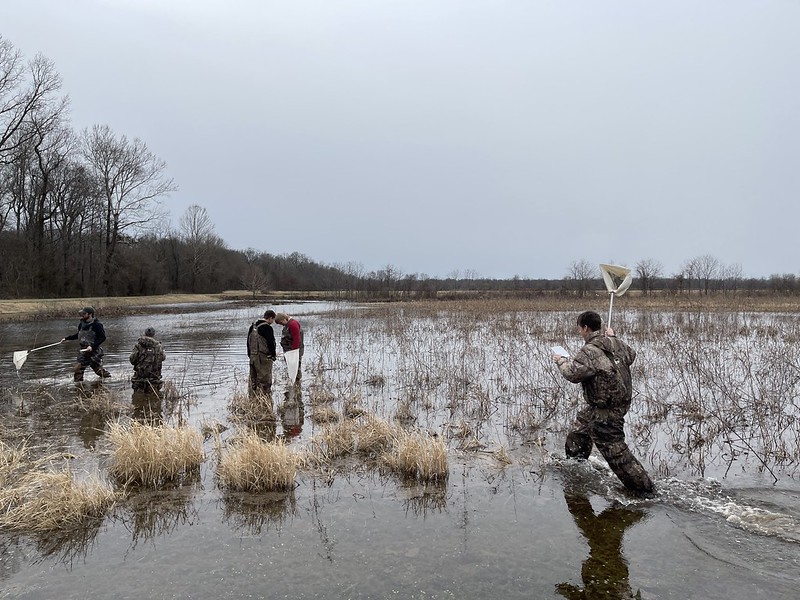Feb. 16, 2022
Hands-on waterfowl education held at Wonders of Waterfowl Workshop
By Rebekah Hall
U of A System Division of Agriculture
Fast Facts:
- Workshop offered hands-on learning about waterfowl and management practices
- 4-H members studied duck habitat and food, species identification, and more
- Partnership between Arkansas 4-H, UA Monticello and Five Oaks Duck Lodge the first of its kind
(529 words)
(Newsrooms: With additional art at flic.kr/s/aHBqjzCsBu)
HUMPHREY, Ark. — Duck hunting is a passionate pastime for many Arkansans and their
families. The Natural State falls within the Mississippi Flyway, the route followed
by ducks migrating from their breeding grounds in North America to their wintering
grounds in the South. Arkansas 4-H, in partnership with the University of Arkansas
at Monticello and the Five Oaks Agriculture, Research and Education Center, is working
to make sure future generations continue their appreciation of this great resource.
Arkansas junior and senior 4-H members had the opportunity to study ducks and their habitat on Saturday, Feb. 12 at the Wonders of Waterfowl Workshop at Five Oaks Duck Lodge. The workshop welcomed over 40 youth and a few parents for a day of hands-on learning.
4-H students from Arkansas, Clark, Drew, Greene, Hot Spring, Logan, Newton, Perry, Sebastian and White counties rotated among several stations, including waterfowl habitat and food, species and wing identification, migration technology, hidden hazards and the banding and release of live ducks.
George Dunklin Jr., owner and manager of Five Oaks Duck Lodge, told participants he was glad to host the first workshop of its kind at the facility.
“Y’all are the first participants of the Wonders of Waterfowl Workshop,” Dunklin said. “So, we’re extremely excited about having y’all here today and having all these wonderful folks that came. You kids are going to be in great hands today, you’re going to learn a lot and the main thing is that you’re going to have fun.”
Members of the inaugural class of the Graduate Certificate Program led each learning station, with assistance from undergraduate students pursuing natural resources degrees at the University of Arkansas at Monticello. The unique graduate certificate program prepares students for careers in wetland and waterfowl management, and it is offered through a partnership among the Five Oaks Agriculture, Research and Education Center, the University of Arkansas at Monticello, and the University of Arkansas System Division of Agriculture.
At the habitat and food station, 4-H members studied plant and invertebrate samples before donning waders and using nets to gather seeds, small invertebrates and other duck food.
Brandon Bennett, a graduate certificate student, told 4-H members about the parameters biologists take into consideration when studying what ducks eat.
“If nothing else, I just want y’all to realize how complex everything is,” Bennett said. “In one dip of the net, you get three different food types from one place.”
Bennett told students that the biologists at Five Oaks work to understand exactly what ducks eat and how to supply those foods on the landscape.
“Because if we don’t have it on the landscape, we’re not going to have ducks anymore,” Bennett said.
In the final portion of the workshop, graduate certificate students and University of Arkansas at Monticello undergraduate students showed 4-H members how to band live ducks that were caught earlier that day. 4-H students then released the banded ducks back into the flooded fields beyond the Five Oaks Duck Lodge.
For more information or to enroll in Arkansas 4-H, visit 4h.uada.edu/. To learn more about Five Oaks Agriculture, Research and Education Center, visit fiveoaksrec.org/. To learn more about the University of Arkansas at Monticello, visit uamont.edu/.
To learn about extension programs in Arkansas, contact your local Cooperative Extension Service agent or visit www.uaex.uada.edu. Follow us on Twitter and Instagram at @AR_Extension. To learn more about Division of Agriculture research, visit the Arkansas Agricultural Experiment Station website: https://aaes.uark.edu. Follow on Twitter at @ArkAgResearch. To learn more about the Division of Agriculture, visit https://uada.edu/. Follow us on Twitter at @AgInArk.
About the Division of Agriculture
The University of Arkansas System Division of Agriculture’s mission is to strengthen agriculture, communities, and families by connecting trusted research to the adoption of best practices. Through the Agricultural Experiment Station and the Cooperative Extension Service, the Division of Agriculture conducts research and extension work within the nation’s historic land grant education system.
The Division of Agriculture is one of 20 entities within the University of Arkansas System. It has offices in all 75 counties in Arkansas and faculty on five system campuses.
Pursuant to 7 CFR § 15.3, the University of Arkansas System Division of Agriculture offers all its Extension and Research programs and services (including employment) without regard to race, color, sex, national origin, religion, age, disability, marital or veteran status, genetic information, sexual preference, pregnancy or any other legally protected status, and is an equal opportunity institution.
# # #
Media Contact:
Rebekah Hall
rkhall@uada.edu
@RKHall_
